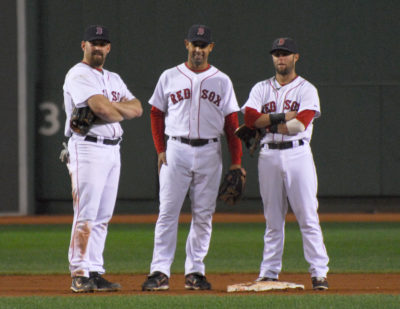
Back in 2006, a Boston Red Sox prospect struggled mightily upon first arriving in the big leagues. He was too small. Too slow. Too average. You name it, he heard it.
In the two seasons that followed, this shortstop moved over to second base and went on to win both the American League Rookie of the Year and Most Valuable Player.
That player, of course, is Dustin Pedroia.
Several factors contributed to Pedroia’s rise: his relationship with manager Terry Francona, his unique personality and tenacity, his incredible fielding abilities, and the tutelage of veteran Red Sox infielder Alex Cora.
Now a 12-year veteran himself, Pedroia will again have Cora as a mentor. This time, however, instead of turning double plays together, Cora will be the one writing Pedroia’s name on the lineup card.
That’s right. Alex Cora has been named the 47th manager in Boston Red Sox history. It seems fitting, doesn’t it?
Immediately after John Farrell was axed earlier this month, Cora emerged as the leading candidate to replace him, and it seemed to be only a matter of time before the announcement came. Sox President of Baseball Operations Dave Dombrowski interviewed Cora soon after, and it was clear he was the man for the job.
The Sox were waiting for the American League Championship Series to end, hoping to finalize and publicize the agreement with Cora if his Astros were eliminated. Since they beat the New York Yankees in an exciting 7-game series, Boston did not want to wait any longer. (They will have to wait, however, until after the World Series for Cora’s introductory press conference.)
On Sunday, the announcement finally came.
“I am extremely honored and humbled to be named manager of the Boston Red Sox,” Cora said in the Red Sox’s official press release, “And I want to thank Dave [Dombrowski], John Henry, Tom Werner, and Sam Kennedy for giving me such a tremendous opportunity. Returning to the Red Sox and the city of Boston is a dream come true for me and my family and I look forward to working towards the ultimate goal of winning another championship for this city and its great fans.”
It was clear that every member of the Sox brass agreed with the move. It was a no-brainer.
“We were very impressed when we interviewed Alex,” Dombrowski said. “He came to us as a highly-regarded candidate, and from speaking with him throughout this process, we found him to be very knowledgeable, driven, and deserving of this opportunity.”
Sox principal owner John Henry, who will sign Cora’s paychecks and Sox chairman Tom Werner, were also fully on-board.
Henry called Cora “a natural leader to guide our clubhouse,” remarking that “his baseball acumen and his ability to think strategically are uncommon for someone his age.”
Werner echoed Henry’s approval, adding that Cora is “uniquely positioned to instill a championship culture” in Boston.
The statements of praise from the Sox’s top three executives are telling.
While there were many reasons to hire Cora, Dombrowski placed emphasis on a select few attributes: Cora’s familiarity with Boston, his attention to analytics, his communication skills, his ability to connect with players of all ages, and the fact that he is bilingual.
Henry and Werner focused on Cora’s intangibles—leadership, youth and an ability to create a winning culture.
At the end of the day, Cora brings to the table what Farrell could not. Through superior communication and analytics, and his Latino heritage, Cora will connect with his players. He’s young, bright, and respected. He offers a new voice and a fresh perspective. He is exactly what the Red Sox needed.
Sure, there will be growing pains. Cora has never managed in the big leagues and he’s very young (he’s exactly one month older than David Ortiz). He will have to learn on the job, and he’ll make mistakes. But when push comes to shove, he was perfect for the job.
When Alex Cora played for the Sox from 2005-08, it wasn’t his power at the plate or speed on the base paths that made him a valuable and beloved member of the team. Cora was a mature and respected presence in the clubhouse, and he played an integral role in mentoring young players like Pedroia.
Cora taught Pedroia the ropes in 2006 and 2007. Now he has the task of taking a talented and rather young Red Sox team to the next level. After two consecutive ALDS losses, it’s up to Cora to motivate and inspire this team to be the best it can be. It won’t be easy, but the Red Sox seem to have faith that he will succeed, and for whatever it’s worth, so do I.
As Werner said, “Welcome home, Alex.” This should be fun.





















































































































